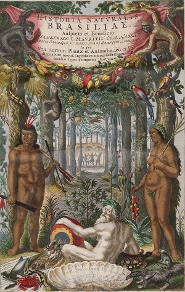 The tenure of Johan Maurits of Nassau (1604–79), a member of the princely House of Orange, as single governor-general in the Dutch colony in Brazil epitomizes the monarchical overtones—crowned by processes of somewhat problematic self-glorification—of republican rule in the United Provinces’s overseas arena. At Maurits’s princely court in Brazil, the Dutch Republic’s (extended) ceremonial considerations still proved too close for comfort. Upon his dismissal (1644), back among republican ranks in Northern Europe the former governor-general who had so boldly outstretched the social scale was left with symbolic spoils only. Maurits nonetheless held on to the echo of his regal aura by smoothing the imposed remove from (physical) court through its representation in print and poetry.
The tenure of Johan Maurits of Nassau (1604–79), a member of the princely House of Orange, as single governor-general in the Dutch colony in Brazil epitomizes the monarchical overtones—crowned by processes of somewhat problematic self-glorification—of republican rule in the United Provinces’s overseas arena. At Maurits’s princely court in Brazil, the Dutch Republic’s (extended) ceremonial considerations still proved too close for comfort. Upon his dismissal (1644), back among republican ranks in Northern Europe the former governor-general who had so boldly outstretched the social scale was left with symbolic spoils only. Maurits nonetheless held on to the echo of his regal aura by smoothing the imposed remove from (physical) court through its representation in print and poetry.
Maurits’s memory has famously been associated with publications that connect geography and natural history to the celebration of colonial enterprise, ranging from Barlaeus’s Rerum per octennium in Brasilia historia (1647) over Piso and Marcgraf’s Historia Naturalis Brasiliae (1648) to Piso’s De India Utriusque (1658). Another monumental publication, however, has so far remained overshadowed by these books’ more pervasive fame and fortuna: the epic poem Mauritias (1647), written by Franciscus Plante (1613–90), but commissioned and subsidized by Maurits himself. During this seminar, we will combine approaches from book history and classical reception studies to unpack just why and how Johan Maurits was represented on the paper stage of the Baroque as the shape-shifting hero of politically coloured poetry and cultural print production.
Programme
Moderator: Matthijs Jonker (KNIR)
Respondent: Susanna de Beer (KNIR)
14.30 Welcome (coffee/tea)
14.45-15.00 Introduction: Matthijs Jonker (KNIR), Alessandro Metlica (ERC RISK – Università degli Studi di Padova), Gloria Moorman, and Giacomo Comiati (ERC RISK – Università degli Studi di Padova)
15.00-15.25 Gloria Moorman (Università degli Studi di Padova), Erudition for Sale: Reputation and Rivalry in the Dutch Book World
15.25-15.50 Mariana Françozo (Universiteit Leiden), The Books of Dutch Brazil: Some Aspects of Piso and Marcgraf’s Publication and Reception History
15.50-16.20 Discussion
16.20-16.45 Giacomo Comiati (Università degli Studi di Padova), Plante’s Mauritias: A New Aeneid or a New Punica? Receiving Silius Italicus in the Seventeenth-Century Republican World
16.45-17.10 Arthur Weststeijn (Università degli Studi di Padova), Caspar Barlaeus and the New World: The Making of an Imperial Ideologue
17.10-17.25 Response Susanna de Beer (KNIR)
17.25-17.45 Discussion
17.45-18.45 Reception
Organisation: Dr. Matthijs Jonker (KNIR), Dr. Gloria Moorman, and Dr. Giacomo Comiati (Università degli Studi di Padova). This event is part of the Seminar Series Storie connesse. Orientamenti di storia globale dell’età moderna (Connected Histories: Orientations of Global History in the Early Modern Period), organized by the KNIR (Matthijs Jonker) – Reale Istituto Neerlandese di Roma, the ISEM CNR – Istituto di Storia dell’Europa Mediterranea, Consiglio Nazionale delle Ricerche (Angelo Cattaneo), and the SAGAS, UNIFI – Dipartimento di Storia, Archeologia, Geografia, Arte e Spettacolo, Università degli Studi di Firenze – Centro interuniversitario GLOBHIS (Rolando Minuti). The seminar equally forms part of the output of the ERC-Project RISK. Representing Republican State Power in the Europe of Absolute Monarchies. Late 16th – Early 18th Century (PI Alessandro Metlica).






